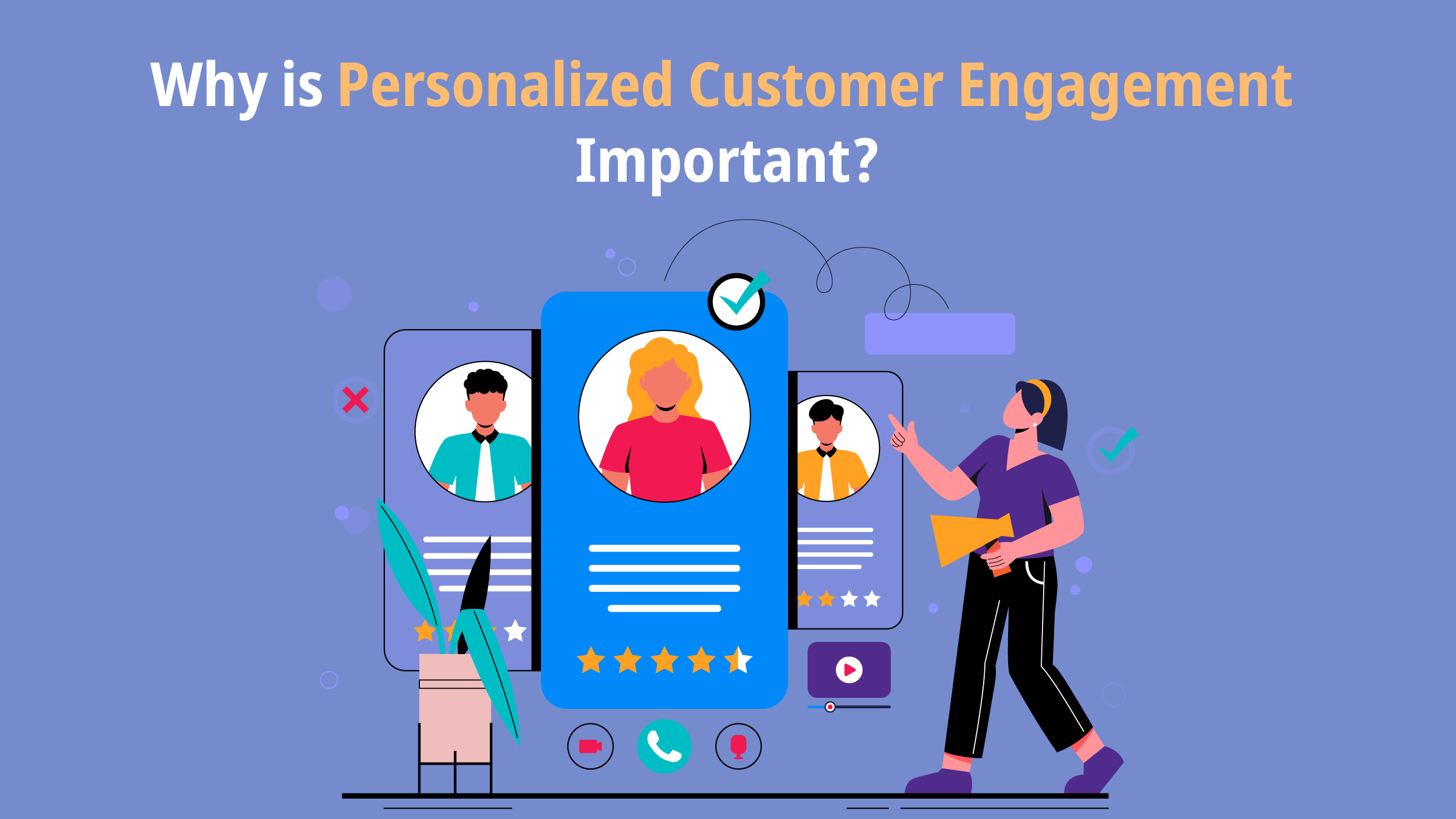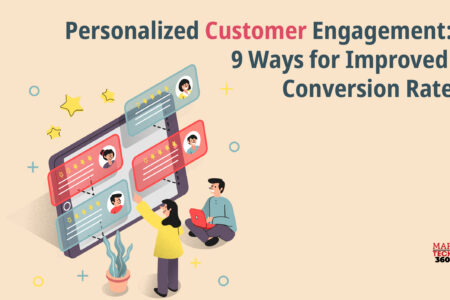Personalized customer engagement is a key aspect of marketing nowadays. As marketers aim to improve their campaigns and reach a broader audience, personalization has emerged as both the preferred and most effective strategy.
With revenue per user increasing up to 166%, personalized engagement is probably one of the most effective strategies businesses can implement. This article explores the concept of personalization of customer experience, its importance, and the best 5 ways to build better engagement.
What is Personalized Customer Engagement?
Personalized customer engagement is an approach used by businesses to interact and communicate with their customers in a way that is tailored to their individual needs, preferences, and behaviors. It involves using customer data and insights to deliver targeted and relevant messages, offers, and experiences.
Why is Personalized Customer Engagement Important?

Enhanced Customer Experience
Personalization enables businesses to deliver relevant content, recommendations, and offers that resonate with individual customers. This tailored approach leads to a more positive customer experience, increasing satisfaction and loyalty.
Increased Customer Loyalty and Satisfaction
When customers feel understood and valued, they are more likely to remain loyal to a brand and have higher levels of satisfaction. Personalized engagement demonstrates that their needs and preferences are being considered, fostering a stronger connection with the brand.
Improved Conversion Rates
By delivering personalized offers and recommendations, businesses can increase the likelihood of customers making a purchase. Personalized engagement creates a sense of relevance and urgency, driving higher conversion rates.
Better Customer Insights
Personalized customer engagement generates valuable data and insights about customer preferences, behaviors, and buying patterns. This information can be utilized to enhance product offers, boost marketing tactics, and raise overall company performance.
Meeting Customer Expectations
Customers expect a more personalized and relevant experience from the brands they interact with. Personalization allows businesses to meet these expectations and stand out from competitors.
Building Stronger Relationships
Personalized engagement helps businesses build stronger relationships with their customers. By understanding their needs and preferences, businesses can tailor their communication and offerings, fostering trust and loyalty.
Maximizing Data Utilization
Personalized customer engagement enables businesses to make the most of the vast amount of customer data they collect. By analyzing this data and using it to personalize interactions, businesses can create more targeted and effective marketing campaigns.
Also Read: What is a Customer Engagement Platform? Why Does it Matter?
9 Ways Personalized Customer Engagement Improve Client Relationships
Personalized greetings are a simple yet powerful way to build better relationships with customers. Addressing customers by name can create a sense of belonging and trust, showing that your business recognizes and values them as individuals. This practice doesn’t have to be complex; using a customer’s name in an email or on a website is a great start.
To make personalized greetings more scalable and efficient, businesses can use customer data and segmentation tools, such as e-commerce platforms that use stored cookies, to personalize website experiences.
Customize your communication
Understanding the customer’s journey is crucial for effective personalized engagement. Tailoring messages and offers to the customer’s specific stage in the buying process can significantly increase engagement.
For instance, an e-commerce store might send personalized emails to customers who abandoned their carts, encouraging them to complete their purchases.
Using tools like surveys, web analytics, and social media monitoring can help gather valuable insights into customer preferences and pain points, allowing businesses to customize their communication effectively.
Invest in one-to-one interactions
One-to-one interactions, such as live chats or phone calls, can significantly enhance customer relationships by providing personalized support and assistance. These interactions create a sense of intimacy and trust, as businesses can address specific customer needs and concerns directly.
Tools like chatbots or AI-based systems can handle repetitive queries, while human agents focus on more complex issues. Training agents in empathy and active listening can further improve the quality of these interactions, leading to higher customer satisfaction and loyalty.
Offer rewards and incentives through loyalty programs
Personalizing rewards and incentives can significantly boost customer loyalty. Tailoring rewards to individual customer needs and preferences, such as customized discounts or exclusive offers, makes customers feel valued.
Loyalty programs that reward customers for their purchases and offer personalized discounts or free products based on customer data can enhance engagement. Regularly reviewing and updating these programs ensures they remain relevant and effective.
Show personalized recommendations
Personalized recommendations can enhance customer engagement by showing that your business understands their needs and preferences.
For example, using a customer’s browsing or purchase history to suggest similar or complementary products can create a sense of personalized attention.
Making use of technology like machine learning and AI to analyze customer data allows for scalable and efficient personalization. Regularly updating the customer data and recommendation algorithms ensures that suggestions remain relevant.
Ask for feedback and reviews
Encouraging customers to share their experiences and opinions can improve engagement and trust. Conducting customer satisfaction surveys and allowing reviews on your website helps gather valuable feedback.
Analyzing this feedback using tools like sentiment analysis can help identify patterns and areas for improvement. Acting on customer feedback shows that your business values their opinions and is committed to improving their experience, further building trust and engagement.
Personalizing product usage data
Product usage data can be used to send personalized support emails or messages based on customer behavior. For example, if a customer is slow to onboard, this can trigger a support email. If a customer is ready to use an advanced feature, send a tutorial tip. Usage data can also highlight upsell opportunities or identify customers at risk of churn who may need additional support.
Using personalized in-app activity and achievement data
In-app activity and achievement data offer opportunities for real-time personalized communication. Providing relevant information and support based on what customers are doing in the app, such as prompts or pop-up tips, can enhance their experience. Celebrating customer achievements, like completing onboarding, with personalized messages can also increase engagement.
Leveraging Data on Feature Usage
Feature usage data can be used to personalize communication further.
For example, frequent users of an advanced feature may be targeted with upsell offers, while customers not using a basic feature may receive support messages to prevent churn. This targeted approach ensures that customers receive relevant and timely information, enhancing their overall experience.
Final Takeaway
Personalized customer engagement is a vital strategy for businesses to create meaningful connections with their customers. By leveraging customer data and insights, businesses can deliver tailored experiences, relevant offers, and personalized communication across multiple channels.

